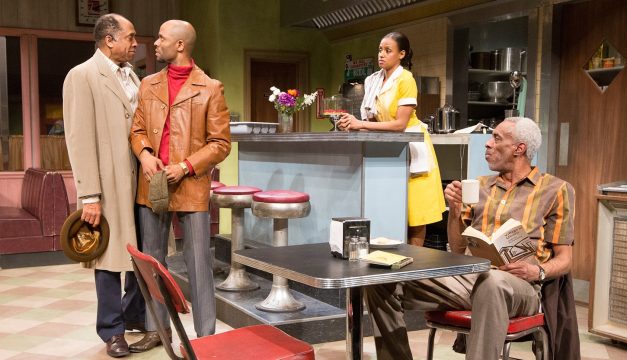Theater Review: Two Trains Running Is Electric at the Arden

The ensemble cast of Two Trains Running at the Arden Theatre. (Photo by Mark Garvin)
Call it a hunch born of long experience, but sometimes I can tell even before a show starts that it’s going to be special. I knew it about the Arden’s Two Trains Running from one look at David P. Gordon’s set — a modest 1960s diner, meticulously realistic, but framed by more abstract architectural fragments of the outlying neighborhood, as well as murals depicting a collage of African-American history.
In other words, it’s an essential distillation of August Wilson’s play, one part of his epic Century Cycle, mostly set in Pittsburgh (as here). Two Trains Running takes place in 1969, but as with the other plays in the cycle, Wilson intends to capture the spirit of an entire decade — in this case, an especially tumultuous one that included the murders of Malcolm X and Martin Luther King, Jr.
It is not one of the most frequently done of Wilson’s plays — but judging from the Arden’s marvelous, gripping production, it is one of his best.
The comparison that kept coming to me — in the best way — is to Eugene O’Neill’s The Iceman Cometh. Two Trains Running similarly is set in a single place, where men (it is substantially male-dominated) come and go, mostly to socialize and share their stories. Wilson, like O’Neill, is a storytelling kind of writer, working in richly poetic imagery and mordent humor.
Considering the volatile times in which the play is set, the stories themselves might seem suprisingly personal, even mundane; work, women, money, and death are major topics; civil rights issues are discussed largely in asides. But there are huge dreams and crushing disappointments embedded in even the most ordinary details. And the sole female here — a waitress named Risa — has her own important, if unexplained, story (years before, she had deliberately disfigured her lovely legs with a razor).
Several of the big moments in Two Trains Running take the form of extended monologues, but mostly the play is made up of conversations. Some are intimate, some larger, and all are superbly (yet seemingly effortlessly) orchestrated — another hallmark of Wilson’s mastery.
Among the many things that director Raelle Myrick-Hodges gets exactly right here is the tone. It would be easy to turn the play into a long elegy, but her production instead has an electric sense of energy in even the mournful moments. Credit the marvelous cast with this, too; they include Darian Dauchan, Kash Goins, Johnnie Hobbs, Jr., Lakisha May, E. Roger Mitchell, U. R., and Damian J. Wallace. Two Trains Running is a true ensemble piece, so I probably shouldn’t single anyone out, but I have to say that Hobbs — a Philadelphia actor who in his long career has given one great performance after another — is at the top of his game.
I could go on, but I’ll leave the discoveries to you. The Arden’s Two Trains Running is a major achievement, and a must-see for serious theater goers this spring.
Speaking of spring — and having duly praised the production — please forgive me a soap-box moment in closing. A truism all theater critics know is: Spring brings Black History Month — and Black History Month brings August Wilson. Mostly this is a good thing; in addition to Two Trains Running, we recently had a fine production of The Piano Lesson at the McCarter.
But Wilson is a great playwright, not just a “great Black playwright.” Why not schedule Wilson plays at other times — and more frequently? The last time I checked, there were 12 months in a year — and a production of this quality would be welcome anytime.
Two Trains Running runs through April 10. For more information, visit the Arden Theatre website.


